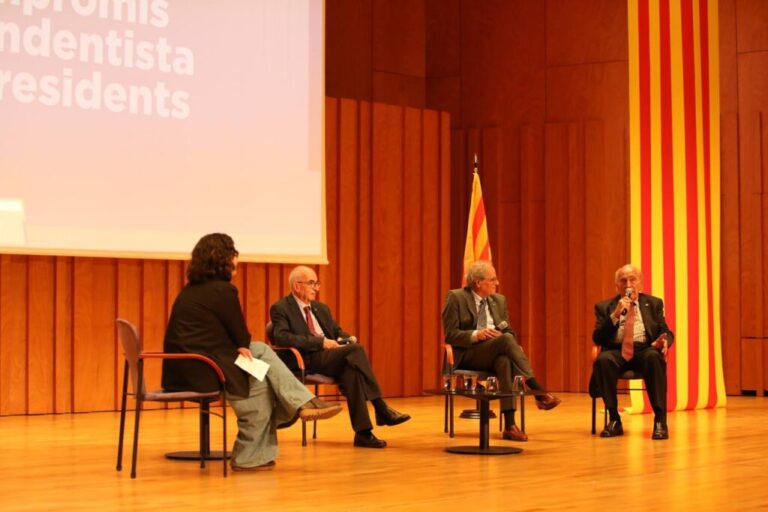
Assemblea gathered presidents Torra, Albinyana and Soler in Barcelona on Friday to analyse the present and future of the Catalan Countries and renew the commitment to independence. Former President of the Catalan Generalitat, Quim Torra, was very critical of the strategy of the pro-independence parties in recent years: “With the extraordinary result of October First and support for independence between 40% and 45%, it is incomprehensible that they do not make a radical program for independence their absolute priority.”
The Catalan National Assembly (ANC) convened three presidents of Catalonia, Valencia and the Balearics in Barcelona on Friday to analyse the political and social present and future of the Catalan Countries, to commemorate the historic day of 3-O of 2017, and renew the commitment to independence.
Josep Lluís Albinyana, president of the pre-autonomous council of the Valencian Country (1978-1979); Cristòfol Soler, president of the Balearic government between 1995 and 1996; and Quim Torra, president of the Generalitat of Catalonia from 2018 to 2020, denounced fiscal plundering, demanded of the pro-independence parties a radical program for independence, and called for a unified reaction from the entire people of the Catalan Countries to confront the linguistic emergency.
The event, held at the Auditorium of the Conservatori Liceu Foundation, began with a presentation by the president of the ANC, Lluís Llach, who stressed that past experience must serve to build a future project for the Catalan Countries.
Quim Torra, 131st president of the Generalitat of Catalonia (2018-2020), emphasized the impact that fiscal plundering by Spain has on the Catalan Countries: “it amounts to €42 billion, 9.9% of its GDP, and this drives public services to collapse and compromises the collective national future.” “It is double what Germany contributes to the EU or equivalent to the combined budgets of the Valencian Country and Mallorca,” he recalled. He also criticized the strategy in recent years of the pro-independence parties: “with the extraordinary result of October First and support for independence between 40% and 45%, it is incomprehensible that they do not make a radical independence program their absolute priority.”
Josep Lluís Albinyana, president of the pre-autonomous council of the Valencian Country (1978-1979), defined Spain as “a failed state, created by the Bourbons and their cohort of the dominant social bloc, by virtue of a hypertrophic centralism as the suitable instrument of colonial politics over the rest of the territories.” He affirmed that “if the Catalan Countries exist, it is because we are a reality, not a chimera.” He also added that language, “while being our common DNA, is not the only sign of identity; the same model of society is equally so”.
Cristòfol Soler, president of the Balearic Government (1995-1996), made clear that “the right of self-determination is a right recognized for peoples as the holders of the right, and it is not the prerogative of Spain to grant or deny it.” Thinking of the next push toward independence, he declared that “in the case of conflict between the principle of territorial integrity and the human right to self-determination, it is the latter that prevails.”
“It is important to know who we are and where we come from: the Catalan Countries, the entire Catalan Nation is our people,” he concluded.
The Auditorium of the Conservatori del Liceu Foundation, with 400 seats, turned out to be too small, with registrations unavailable days in advance — a demonstration of the pro-independence commitment to 3-O and to the future of the Catalan Countries.